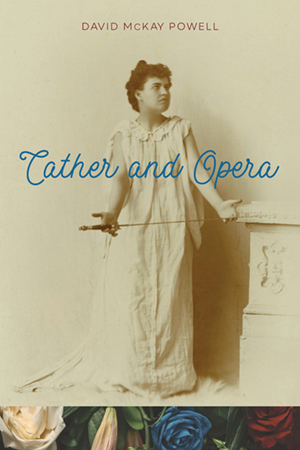
216 pages / 6.00 x 9.00 inches / no illustrations
Literary Criticism / American | Literary Criticism / Women Authors | Performing Arts / Theater History & Criticism
Throughout her fiction, Willa Cather mentioned forty-seven operas. References to opera appear in all but three of her twelve novels and in roughly half of her short stories. Despite a dearth of musical education, Cather produced astute writing about the genre beginning in her earliest criticism and continuing throughout her career. She counted opera stars among her close friends, and according to Edith Lewis, her companion throughout adulthood, the two women frequently visited the theater, even in the early days, when purchasing tickets to attend performances proved a financial sacrifice.
Melding cultural history with thoughtful readings of her works and discussions of opera’s complex place in turn-of-the-century America, David McKay Powell’s Cather and Opera offers the first book-length study of what drew the writer so powerfully and repeatedly to the art form. With close attention to Cather’s fiction and criticism, Powell posits that at the heart of both her work and the operatic corpus dwells an innate tension between high artistic ideals and popular acceptance, often figured as a clash between compositional integrity and raw, personal emotion. Considering her connection to opera in both historical and intertextual terms, Cather and Opera investigates what operatic references mean in Cather’s writing, along with what the opera represented to her throughout her life.
David McKay Powell is associate professor of English at Union College in Barbourville, Kentucky, where his research focuses on the intersections of classical music and American literature.
“David McKay Powell’s Cather and Opera not only is the first book to focus on Cather’s fascination with opera but also provides fresh discussions and sharp commentary about many other aspects of Cather’s life and work. Readers just discovering Cather and scholars alike will find it an enormously useful and entertaining resource.”—John H. Flannigan, retired professor of English, Prairie State College
“Opera had a profound impact on Willa Cather as an artist. This book unpacks both the direct references to opera in Cather’s fiction and the operatic structures that run through her work. Powell’s study is accessible and compelling, especially in its attentiveness to Cather’s early short stories, and readers will come away with a deeper appreciation for the complex artistry of Cather’s fiction.”—Kelsey Squire, associate professor of English at Ohio Dominican University and author of Willa Cather: The Critical Conversation
“Among the valuable services Cather and Opera provides is reminding readers that opera, particularly Wagnerian opera, was a dominant cultural referent in the 19th- and early-20th-century US. . . . Powell sees the contradictions of opera—its heightened emotional expressivity, its refinement and complexity—as dynamics essential to Cather’s work. . . . Cather emerges as an even more fascinating writer.”—Choice
Found an Error? Tell us about it.